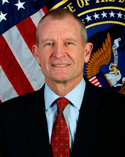Global health linked to U.S. security
January - February, 2009 | Volume 8, Issue 1
 Dennis Blair
Dennis BlairTerrorists' ability to provide health care to people is a key factor in their exerting power on the international stage, the new director of national intelligence told Congress recently.
In an around-the-world survey of U.S. intelligence and national security concerns, DNI Dennis C. Blair said, "Terrorists and warlords have gained local and international stature and even power by providing health services governments could not."
In a written report accompanying his testimony to the Senate Intelligence Committee, Blair also said the U.S.-backed governments of Iraq and Afghanistan suffer "undermined ... credibility" because of their inability to provide health care or clean water.
"Venezuela and Cuba have been particularly adept at parlaying provision of charitable medical services to nationals of other countries into support in international forums such as the United Nations," Blair said, adding, "Hizballah's provision of health and social services in Lebanon over the past 20 years has helped to legitimize the organization as a political force in that country, while Hamas's delivery of similar services was a factor in its legislative electoral success in the Palestinian territories."
Turning to industrial adversaries, he said poor health in both Russia and China threatens the future strength of their armed forces.
"Russia has the overall worst health indicators of any industrialized country. Poor health of Russian children and young people combined with falling birthrates threatens Russian military readiness with a projected halving of eligible military recruits between 2005 and 2018."
He said China's high incidence of chronic disease, brought about in large part by the high prevalence of smoking, "threatens to slow economic growth by incapacitating workers and incurring heavy health-care costs. The health effects of environmental degradation are an increasing source of discontent in China."
The report said the most direct health threats to the United States are HIV/AIDS, a potential flu pandemic and any "mystery disease" like SARS.
But he noted, "Infectious diseases are not the only health indicators with strategic significance. Chronic, non-communicable diseases; neglected tropical diseases; maternal and child mortality; malnutrition; sanitation and access to clean water; and availability of basic health-care also affect the U.S. national interest through their impacts on the economies, governments and militaries of key countries and regions."
Blair said the United States has a "potentially pivotal role" between Europe's commitment to cutting greenhouse gases and developing nations' wariness about harming their economies by stifling carbon emissions.
Blair's testimony appeared to be built on a December 2008 National Intelligence Council report "Strategic Implications of Global Health," which went on to recommend:
- More and better-publicized developed world medical diplomacy efforts, such as the Navy's 2007 humanitarian tour of Latin America by the hospital ship Comfort.
- Working in Afghanistan on hepatitis B, drug addiction, high maternal and child mortality and access to basic health care as a means of bolstering support for the allied reconstruction effort.
- Cooperating with Iran to fight increased incidence of polio in Muslim countries or Iran's own rising drug addiction problem.
More Information
To view Adobe PDF files,
download current, free accessible plug-ins from Adobe's website.